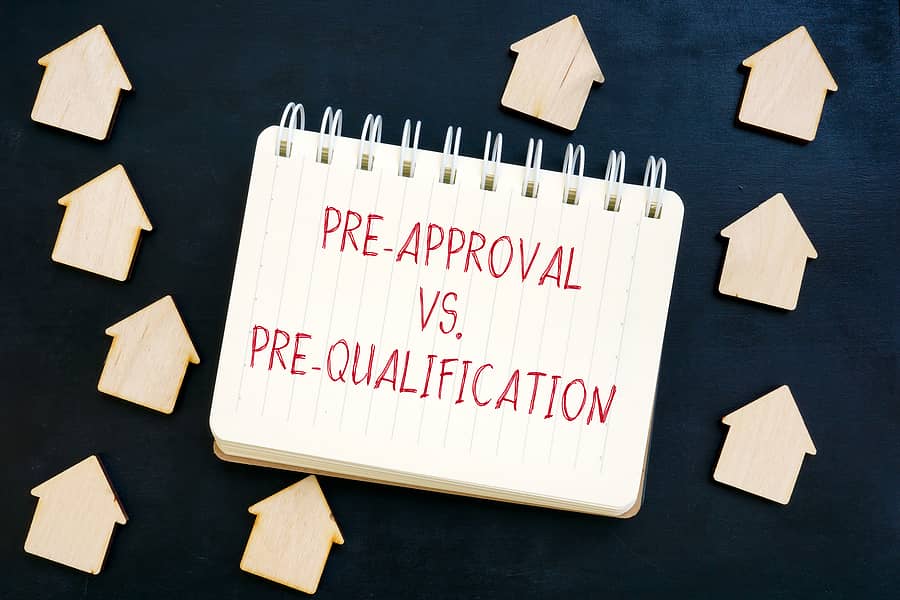Understanding the distinction between getting pre-approved for a mortgage and pre-qualifying for one is essential. Some fundamental things people need to know include the fact that being pre-approved rather than pre-qualified can help you in a competitive housing market.
When the two are compared side by side, pre-qualification is a preliminary estimate. It’s more of a first step that’s not as thorough as a pre-approval.
Understanding the differences between pre-approval and pre-qualification for a mortgage can help you make an efficient, informed decision.
Pre-Qualification Overview
A pre-qualification is an initial step in the home-buying journey. It is a simple process people use when they decide they’re ready to buy a home. It provides the big picture of how big of a mortgage you’ll be approved for. It’s best to think of this as the first step in the mortgage process.
A pre-qualification overview requires:
- Information on your income and assets. Regarding the assets, this is generally an estimate that you can self-report at this stage.
- You also need to supply some information about your existing debts, including credit card loans, student loans, and auto loans. Those are numbers that can be estimated, and they should include personal properties like real estate and vehicles. That information should cover your financial obligations.
Remember, a pre-qualification amount is preliminary, and it will give you a general idea of what you could be eligible for.
Pre-approval involves more in-depth documentation. You’ll need to supply details about your finances rather than self-report the information. The pre-approval process also involves a hard credit inquiry.
Pre-Approval Process
There are several key steps to the process that include:
- A formal application.
- Formal documentation is needed to support the application that includes proof of income like pay stubs and tax assessments.
- That formal documentation needs to include proof of employment and proof that you can pay for both the down payment and closing costs.
- The proof of employment should include your hourly or pay rate or salary. You should also include the length of time you’ve been with the company and assessments from the CRA for 2 years if you’re self-employed.
- The debt that makes up your financial obligations needs to include everything from credit card balances to child and spousal support and car loans.
- The pre-approval process will also involve lenders calculating your debt-to-income (DTI) ratio. This ratio assesses your ability to handle the monthly payments by dividing monthly debts by gross monthly income.
Pre-approval involves a more financial roundup of assets, as well as income verification and credit checks. It gives a more definite picture of the interest rates and loan amount someone can qualify for.
There are some other differences between pre-approval and pre-qualification you’ll need to know about.
Credit Check Requirements
A hard credit inquiry is a requirement for a mortgage in Canada. This is the part of the pre-approval process that will temporarily lower a credit score. It’s important to make sure this score is in decent shape before you apply.
Lenders can also perform what’s called a soft credit inquiry that’s also used for pre-approval for lines of credit credit cards and just checking your credit score. These don’t affect your credit score at all.
It’s important to make the distinction between pre-approval and pre-qualification for credit check requirements. For a pre-qualification you don’t need to go through the steps listed above because you self-report.
Understanding more about the pre-approval process means considering its requirements.
Binding Nature of Pre-Approval
It’s important to remember there are several different moving pieces during any mortgage application process. Ontario’s Financial Services Regulatory Authority is a good source for understanding the requirements, like the ones around the pre-approval process.
- Keep in mind that there are obligations from a pre-approval that include holding a specific interest rate for some time. If you submit an application and meet the conditions, the interest rate that gets quoted is valid even if the rates go up.
- You’ll need written confirmation of the maximum amount and the mortgage rate when you go through the pre-approval process. Keep in mind you’re not guaranteed either indefinitely. The offer that gets presented is only good for a specific time.
Importance in the Homebuying Process
The pre-qualification and pre-approval process makes the mechanics of buying a home and getting a mortgage smoother. It provides a sense of clarity on your financial standing and what you can afford.
Mortgage pre-approval demonstrates to sellers that you are a credible and qualified buyer. It can also give you an edge in a competitive housing market.
It’s important to remember that an extension of pre-approval is called the conditional pre-approval. This is where the lender commits to providing you with mortgage numbers when certain conditions are met. Some of these might include a letter describing part of a down payment as a gift or a pay stub highlighting a raise that was granted.
One of the biggest reasons to get pre-approved in the home-buying process is to get a clear snapshot of your budget.
Looking For Mortgage-Related Products?
Mortgage Broker Store focuses on numerous mortgage-related products. One of our priorities is mortgages that don’t meet traditional lending institution requirements. Our team includes private lenders, brokers, and licensed mortgage agents. Let us help you prepare for and get a product that meets your requirements.
Email ron@mortgagebrokerstore.com or call 416-499-2122



